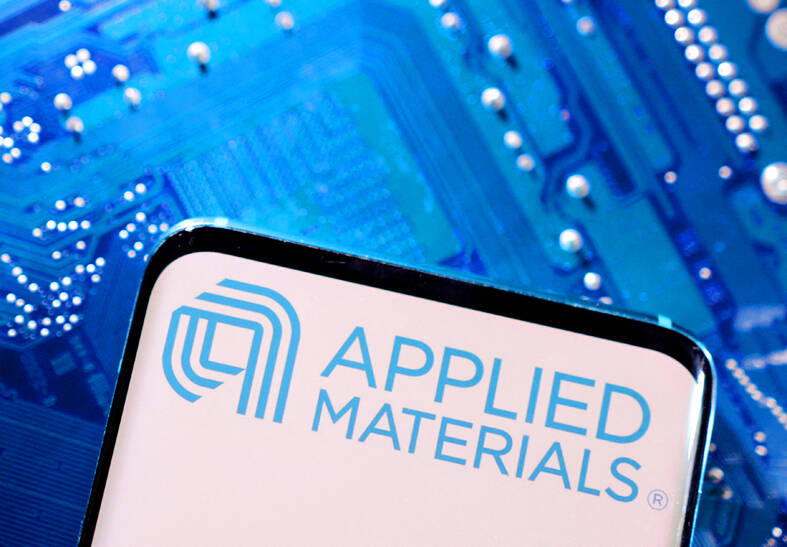Applied Materials Inc, the largest US maker of chipmaking machinery, slid in late trading on Thursday following a report that it faces a US criminal investigation for allegedly contravening export restrictions to China.
The company is being probed by the US Department of Justice over dealings with China’s biggest chipmaker, Semiconductor Manufacturing International Corp (SMIC, 中芯), Reuters reported.
The department is looking at whether Applied Materials sold hundreds of millions of dollars of equipment without the proper licenses, the news outlet reported, citing unidentified people familiar with the situation.

Photo: Reuters
The justice department declined to comment.
Applied Materials declined to discuss details of the case, but said that it previously disclosed a federal review of China deliveries.
“Applied Materials first disclosed in October 2022 that it received a subpoena from the US Attorney’s Office for the District of Massachusetts requesting information relating to certain China customer shipments,” the company said in an e-mailed statement. “The company is cooperating with the government and remains committed to compliance with global laws, including export controls and trade regulations.”
The report overshadowed generally upbeat quarterly results from Applied Materials, which topped analysts’ estimates with its earnings and forecast.
Shares of Applied Materials, based in Santa Clara, California, fell as much as 7 percent in extended trading.
The company and its peers are operating under increasingly strict rules imposed by Washington on exports of chip technology to China. The US has said such rules are needed to protect national security and requires companies to seek licenses to send certain types of machines or have dealings with particular companies in the Asian nation.
Reuters said that Applied Materials produced chipmaking gear in Gloucester, Massachusetts, and then shipped it to a subsidiary in South Korea. It then went to China’s SMIC, people familiar with the investigation said.
SMIC was placed on a so-called entity list in December 2020 by the US Department of Commerce, which cited alleged links between the chipmaker and the Chinese military.
Applied Materials’ fiscal fourth-quarter earnings, excluding some items, amounted to US$2.12 a share, the company said. Sales were little changed in the quarter, which ended on Oct. 29, at US$6.72 billion. Analysts estimated earnings of US$1.99 a share and revenue of US$6.54 billion.
Fiscal first-quarter sales would be about US$6.47 billion, the company said. That compares with analysts’ average estimate of US$6.34 billion. Excluding some items, profit would be US$1.72 to US$2.08 a share in the period, which ends in January. The average projection was US$1.84 a share.
China had been one of the fastest-growing markets for chip equipment, but the US restrictions have begun to take a toll on sales.
A recent tightening of the export restrictions would not have an incremental impact on Applied Materials’ results, the company said on Thursday.
In fiscal fourth quarter, that market provided 44 percent of overall sales and would remain at an “elevated level” in the current period because of some large shipments to a computer memory customer, the company said.
Over time, China would shrink back down to about 30 percent of sales — its historical level, it said.
Dickerson said he remains bullish on the outlook for demand for his products overtime.
“Longer term, the setup is really great,” he said in an interview.

Shares in Taiwan closed at a new high yesterday, the first trading day of the new year, as contract chipmaker Taiwan Semiconductor Manufacturing Co (TSMC, 台積電) continued to break records amid an artificial intelligence (AI) boom, dealers said. The TAIEX closed up 386.21 points, or 1.33 percent, at 29,349.81, with turnover totaling NT$648.844 billion (US$20.65 billion). “Judging from a stronger Taiwan dollar against the US dollar, I think foreign institutional investors returned from the holidays and brought funds into the local market,” Concord Securities Co (康和證券) analyst Kerry Huang (黃志祺) said. “Foreign investors just rebuilt their positions with TSMC as their top target,

REVENUE PERFORMANCE: Cloud and network products, and electronic components saw strong increases, while smart consumer electronics and computing products fell Hon Hai Precision Industry Co (鴻海精密) yesterday posted 26.51 percent quarterly growth in revenue for last quarter to NT$2.6 trillion (US$82.44 billion), the strongest on record for the period and above expectations, but the company forecast a slight revenue dip this quarter due to seasonal factors. On an annual basis, revenue last quarter grew 22.07 percent, the company said. Analysts on average estimated about NT$2.4 trillion increase. Hon Hai, which assembles servers for Nvidia Corp and iPhones for Apple Inc, is expanding its capacity in the US, adding artificial intelligence (AI) server production in Wisconsin and Texas, where it operates established campuses. This

Nvidia Corp chief executive officer Jensen Huang (黃仁勳) on Monday introduced the company’s latest supercomputer platform, featuring six new chips made by Taiwan Semiconductor Manufacturing Co (TSMC, 台積電), saying that it is now “in full production.” “If Vera Rubin is going to be in time for this year, it must be in production by now, and so, today I can tell you that Vera Rubin is in full production,” Huang said during his keynote speech at CES in Las Vegas. The rollout of six concurrent chips for Vera Rubin — the company’s next-generation artificial intelligence (AI) computing platform — marks a strategic

US President Donald Trump on Friday blocked US photonics firm HieFo Corp’s US$3 million acquisition of assets in New Jersey-based aerospace and defense specialist Emcore Corp, citing national security and China-related concerns. In an order released by the White House, Trump said HieFo was “controlled by a citizen of the People’s Republic of China” and that its 2024 acquisition of Emcore’s businesses led the US president to believe that it might “take action that threatens to impair the national security of the United States.” The order did not name the person or detail Trump’s concerns. “The Transaction is hereby prohibited,”